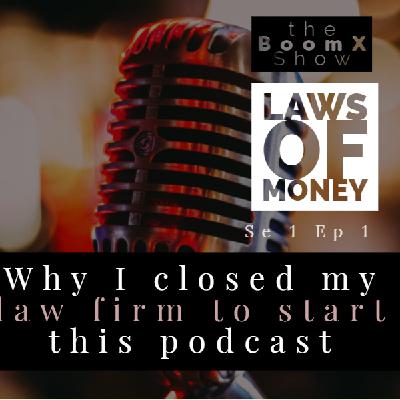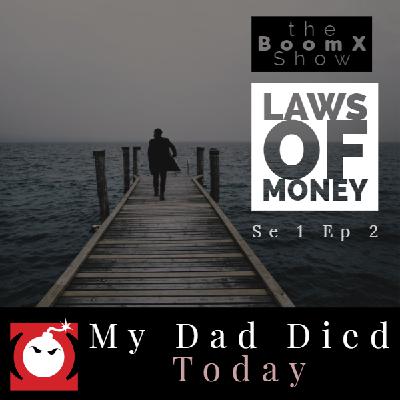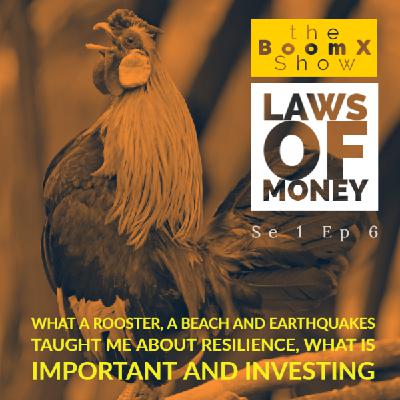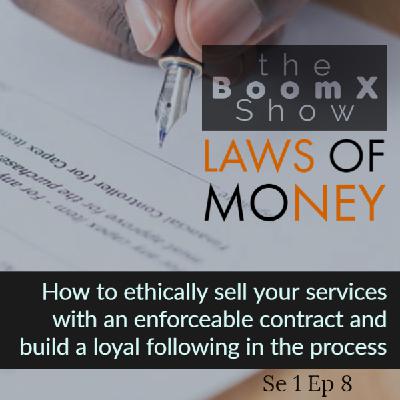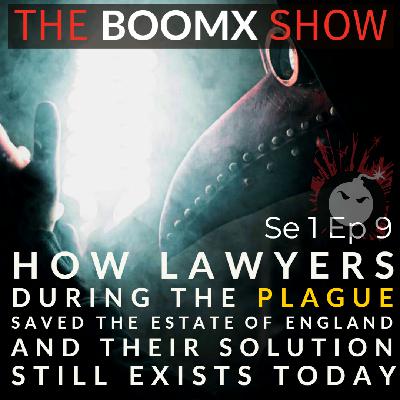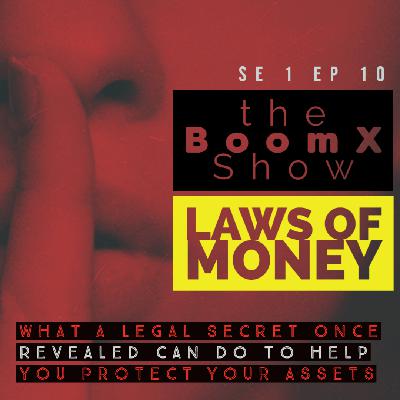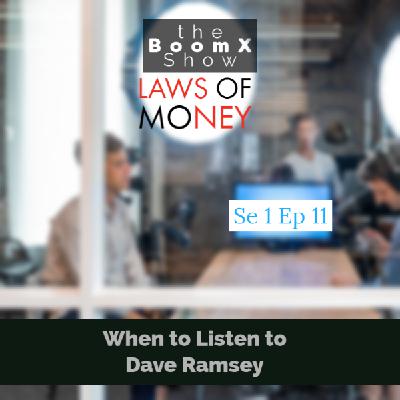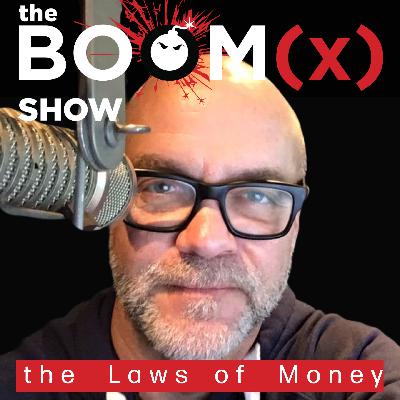Discover The BoomX Show: Laws of Money
The BoomX Show: Laws of Money

The BoomX Show: Laws of Money
Author: Darol Tuttle
Subscribed: 3Played: 12Subscribe
Share
© Copyright BoomX Media Productions, LLC
Description
Throwing out the old playbook, seasoned asset protection attorney Darol Tuttle speaks to anyone of any age or experience who seeks to grow and protect family wealth for more than a generation. There are laws of money and this podcast shows you how to leverage them.
50 Episodes
Reverse
I decided to close my law firm. I am still a lawyer. I will still help people understand and leverage the law. I do not own and operate a law firm and will not practice law as I once did. The legal services industry is archaic. Expensive. Information is often hoarded when it should not be.I came to the Caribbean to attend a business meeting. I was one of twenty-five entrepreneurs who were lucky enough to participate in a Master Mind with John Lee Dumas and his partner, Kate Erickson. John and Kate operate Entrepreneurs on Fire and Kate’s Take, podcasts on business and business efficiency. After the Master Mind, I stayed in Peurto Rico for a time and recorded the first and third episodes of this new Podcast.I closed my law firm for many reasons. I admit being burnt out. You wouldn’t think practicing estate planning would be stressful but it was. Lawyers take on the problems of others. Clients bring with them expectations and entitlements. They are seldom appreciative. More often, they are resentful of the fee they pay.I also had my eyes opened up to a new world I did not know existed. I suspect this world began to sprout when the internet was invented. The Law was invented in ancient times. Estate planning, my area of practice, began, in most part, during the Middle Ages. Lawyers are trained to look back into time to apply a legal rule of old to a current conflict. Naturally, so busy looking backward, I did not know there was a world out there in which young businesspeople used the internet to promote their product or service. With websites, podcasts and social media, thousands were solving problems for a fraction of the costs of traditional brick and mortar businesses. I wanted to do that.My entire career has been about the laws of money. These laws can be complicated. Legal counsel is necessary to solve some problems but not all. However, in many ways, people seek reliable information. I will go one bold statement further. In many ways, people seek financial awareness that legal documents do not give.This podcast offers listeners information. It also offers some entertainment. Most importantly, it offers a solution.
Six hours after I learned that my father had passed away, I recorded this episode. I recorded it in one, uninterrupted session and it is unedited. I then published it to my website. The next morning, I felt ill at ease. My feelings were not grief about my father's death. As you will soon realize, my father and I were not close. Rather, I worried that I was about to be hit by a bolt of lightning from Zeus for an unlawful or inappropriately disrespectful speech about the dead. As the day wore on and I had not been Zeus-whipped into a pile of burnt pleading paper, I began to respond to those who had listened to it. The feedback was as expected. Likely, the same reaction you have. I have debated including this frank and visceral exposure of my true feelings about my father. In the end, I decided to publish it if for no other reason it might help some other person out there think about family, the frailty of life and a parent's obligation.
In this episode, host Darol Tuttle shares his observations and feelings related to the end-of-life, our attitudes about death and how negative, counter-productive emotions block us from making this critical transition easier and less stressful for your family. The Law has requirements and they must be met. This, a constant theme of the show is reinforced as Darol summarizes different real-life cases in which people have passed away with different levels of preparedness for this final contingency. The Second Law of Money was described by Jack Tar: The financial ship always needs a captain.
Law and money share a common characteristic. Neither can be found in the material world. A dollar bill can be touched. However, a one dollar is exactly the same as a one hundred dollar bill except for the number 1 and a picture of Washington as compared to the number 100 and a picture of Franklin on it. The hundred dollar bill represents a much higher degree of some unspoken value but is physically the same as the item that represents far less. What exactly is money? Listen to the answer to this question as posed to an elite wealth attorney, as interviewed by BoomX Show host, Darol Tuttle. The conversation between the two reveals legal secrets that will give you a bigger picture of your wealth.
What does decision making have to do with the Laws of Money or Lessons of Life for that matter? Everything. Effective decision making is a skill. Some people have honed this skill, most have not. As people age, they become more ensconced in their own particular cognitive biases. What is a cognitive bias, you ask? A cognitive bias is a systemic pattern of deviation from rational thinking. Mr. Wikipedia lists over one-hundred biases. Google that. It is fascinating that there are so many identifiable ways the human brain will fight you in the struggle to make the correct decision. I recorded this episode the day after I sent an email to my email list. The email brought attention to Episode 2 and the story of my father, our relationship and his death. The next morning, my inbox was flooded with messages of similar stories and expressions of support. These stories only confirmed what I had observed in my professional life countless times. When the family leader fails to lead then dies, emotional and financial carnage results. If deep, deep injury is foreseeable with well-nigh mathematical certainty but is avoidable, is not the person who failed to avoid the injury acting intentionally? In criminal cases, there is a fine distinction between negligence, recklessness and intentional action. Unlike civil law, criminal law requires the prosecution to prove “mens rea”, that the accused acted with a “culpable mind.” Yet, the prosecution need not prove that the defendant intended or even imagined the crime of which he or she was later convicted. For example, if a defendant acts with such flagrant disregard as to his or her duty to others is he off the hook because he did not actually plot or even foresee that he would ram his car into a school bus filled with cute kindergartners after drinking a gallon of brown liquor? While he may not have intended to run the red light, he did intend to put a thief in his mouth that would rob him of his wits. Recklessness is intent because the degree of disregard for others is so great. Conviction will result. Most people would agree with that. Yet, within the same group of family leaders who would agree, there are some who will decide NOT to take the action that would avoid the injury to their own family. Does the family leader have a culpable mind? They would say “no” as fervently as the now-convicted criminal. My Inbox is flooded with the children of these family leaders. These messages tell me stories of great pain directly resulting from a cognitive bias, a hiccup in a mental process. The criminal was sure to hurt someone because his decision making was impaired by alcohol and the family leader was impaired by a bias. In this episode, I reveal one such cognitive bias and an exercise I developed to help those who are plagued by this mental hiccup overcome it. Wealth is made up. It is an idea and does not exist in the physical universe. As long as there are homo sapiens on the planet who value a piece of paper with Benjamin Franklin depicted one hundred times more than a piece of paper that is identical in size, color and dimension but for the depiction of George Washington, wealth will survive you. Now, the bias and my solution? Listen to the episode and find out.
What would you do if, suddenly, you could not buy food. And you were afraid to sleep inside your home. Your neighbors decided to leave. A man who lived a block away committed suicide? How would you plan for the future if you just lost your job? A swarm is what geologists call the grouping of earthquakes that have hit Guanica, Puerto Rico. Swarm is as good a name as any to describe over a thousand earthquakes in such a small area, many above 5.0 and at least two above 6.0. While there has not been a "big one", a single massive quake to bring sudden and dramatic devastation, the constant month-long shaking of the homes, road, stores and spirits of Guanica has been even more cruel if not as renowned. This tragedy is also headquartered in the one place on earth I intended to call home. I had spent impactful moments there. Playa Santa, just outside of Guanica, was the location of a lovely apartment with a view of the Caribbean. The landlord had my deposit in escrow and only my signature on a lease awaited. I had gone to a remote beach every other day to clean the plastic from it. I yelled at Playa Santan roosters that just had to wake at the playful satanic hour of 4 am. A lot had happened in such a short-time in Guanica and Playa Santa, the launch of this very podcast as one example, that I just had to tell the story of my time there and the friends who still struggle there. As if on cue, however, the episode does succeed in laying out an investment idea. Really, this idea is an investment method. I first heard of it from a client about a year ago. I keep this method tucked away until the very last moments of the podcast.
This episode is a legal update with a higher view of planning to include three necessary philosophies of wealth planning to help you make the appropriate decisions. The episode describes the 2020 Secure Act but in the context of estate planning law, dating back to British medieval common law, three other important legal changes in the preceding five years and the new reality of planning with retirement accounts. This episode introduces you to idea of "workarounds". Yes, that's right! We can mitigate the negative impacts of the SECURE Act. On December 20, 2019, President Trump signed the Setting Every Community Up for Retirement Enhancement Act (SECURE Act). The SECURE Act, which is effective January 1, 2020. The SECURE Act has several positive changes: It increases the required beginning date (RBD) for required minimum distributions (RMDs) from your individual retirement accounts from 70 ½ to 72 years of age, and it eliminates the age restriction for contributions to qualified retirement accounts. However, one provision of SECURE nullifies all of the benefits of the act and is a threat to your family’s generational wealth. That is a bold statement, I realize. I stand by it. The SECURE Act does provide a few exceptions to this new mandatory ten-year withdrawal rule: spouses, beneficiaries who are not more than ten years younger than the account owner, the account owner’s children who have not reached the “age of majority,” disabled individuals, and chronically ill individuals. However, proper analysis of your estate planning goals and planning for your intended beneficiaries’ circumstances are imperative to ensure your goals are accomplished and your beneficiaries are properly planned for. Most people do not care enough to spend time let alone money on taking specific actions to adjust their plan, if they have one, to account for the changes brought to us courtesy of SECURE. Perhaps, there is nothing wrong with this attitude. If you view SECURE from the perspective of the government, it makes sense. Too much money is being protected for the benefit of families and not taxed. The government and even the economy is better off to get that money back into circulation. However, I doubt that people decide to pay unnecessary taxes, fees and stand idly by as wealth is lost because they are on the government's side. During most of my career, I thought this attitude, that action should not be taken to avoid a financial loss, was just a mental hiccup, a cognitive bias that prevents some people from making correct decisions about wealth. However, as I have grown in my profession, I now see that it is more related to one, of three, philosophies about wealth. Unfortunately, the attitude that is passive about protecting wealth is the traditional and, therefore, prevalent model. The reasons it is traditional is all about human longevity. Throughout all of human history, humans have lived short lives. In the Middle Ages, when probate and trust law invented, men lived, on average, to be just twenty-five years. That average age was not doubled until the early 1900s, over a thousand years later. However, in the last century, the average life expectancy of an American male has almost doubled again. Biologically, there are more opportunities and different challenges than the current perspective of the Law even realizes. The law is reactive, not proactive. As such, the traditional model has only sought to pass wealth from an asset owner to the next generation because the asset owner would live a short life as would the next generation. Life has been so difficult in terms of survival, the Law has simply left it at that. As such, There are three models in planning, the traditional model is estate planning and views life and, therefore, wealth, as short. The other two models do not. I will refer to these models often and...
This episode introduces young business leaders to the basic requirements of a contract, focusing on the legal requirement that a contract must have a meeting of the minds between the buyer and seller as to material terms. Price is a material term. Comparing real examples of a sales process when the host solicited advice from two different "business coaches", the episode makes the case that understanding the laws of contracts also bring integrity to your business and will help build a loyal following.
This episode marks the first of 30 daily episodes to help listeners build a true asset protection system. Published on the same date the host's home state issued a quarantine, stay at home order, the episode describes the emphasis on publication of reliable information rather than perfectly produced podcast episodes. Learn how medieval lawyers devised the first asset protection trust to save the estates of England during the bubonic plague and how this legal construct still exists today.
A legal secret is a principle, construct or strategy that is obscured intentionally or negligently. These legal secrets can make a difference once revealed and, in some cases, mean the difference between wealth erosion or protection. As part of the asset protection series, asset protection attorney and your host, Darol Tuttle, introduces listeners to the basic purpose and features of a true asset protection plan and his commitment to revealing all legal secrets that obstruct this goal.
How does a radio show host stack up against a trained wealth professional who chose a legal profession when advising on topics that matter to your family's wealth? It is a valid question. Should you listen to Dave Ramsey? If so, is his expertise limited? When should his advice be followed and when should it be considered entertainment?In this episode, Darol compares the different professional requirements for an attorney as compared to a financial advisor. The education and training aside, the importance of asset protection as compared to the message of the radio show hosts as it relates to basic budgeting. In plain English, Darol lays out a simple test for all listeners of any financial show to use when deciding if the host deserves another second of your time.
Endorsed by Dave Ramsey, Mama Bear Legal Forms is a legal document creation application. In this review, Darol Tuttle walks through the creation of a Last Will and Testament, health care power of attorney and financial power of attorney, and rates the website design, legal/technical, accuracy in representation, asset protection and value of Dave's endorsement. Does Mama Bear Legal Forms live up to the hype?
A decade ago, BoomX Show host Darol Tuttle aired his first radio episode. Unconfident, he took the airwaves by interviewing two of his clients who had found their stubborn, aged mother unconscious in her garden. The weather that day was below freezing and she was near death. At the time, Darol was skilled in elder law but still found himself moved by their story and the lengths to which they were forced to go to manage their mother's care.In the episode, Darol laid out the costs of care as they existed in 2011. Then, he analyzes the levels of care, the increase in prices in just ten years, and gives listeners an important resource to learn how they can avoid the mistakes this family made.Darol also announces the launch of "How to Protect Your Nest Egg: How to Pay for Unreimbursed Medical Expenses Without Paying High Insurance Premiums or Hiring an Expensive Lawyer." This course also gives students access to an easy-to-use drafting app so that they can walk through a guided interview and have the legal document they need to start a true asset protection plan delivered to their Inbox in seconds. To learn more, check out the new BoomX Academy.
In this episode, Darol gives insight, tips, and resources to solve the problem of asset loss due to unplanned care costs. An important resource can be found at the BoomX Academy. Go to www.boomxacademy.com for more information. Financial planning aside, Darol interviews Lisa Doyle, the owner and operator of Cay Care, a care assessment, management, and placement company. A registered nurse, Lisa lays out the value of a separate assessment before making any care decisions. She succinctly summarizes care options, ways to include and empower the aged patient, and a framework for successful decision making.
Special guest Patrick Palace discusses the state of the legal profession, the ways Covid has changed expectations, and the benefits of a virtual-only law firm. Patrick is the owner of the Palace law firm, located in Tacoma, Washington. He is also a frequent guest on podcasts through the Legal Talk Network, active in his local bar as well as the American Bar Association, and a respected contributor on topics related to technology and the law. You can learn more about Patrick by visiting his website www.palacelaw.com.This episode gives listeners a peek into a values-driven law firm but also a project BoomX Show host, Darol Tuttle, is launching to reduce legal fees to just $40.00 per month. This project, the BoomX Academy, gives users access to his firm's drafting app, live meetings weekly, an online community of students, document storage, and more. You can learn more by visiting www.boomxacademy.com.
Most retirees are concerned about long-term care costs. Yet, most people take no steps to mitigate the risk of high costs let alone develop a solid strategy to finance those costs. In this episode, BoomX guest Brian Ott of 525 Advisors explains the ins and outs of long-term care costs and solid tips on making the right choice. Brian Ott is a Retirement Income Certified Professional (RICP), i.e.a financial professional who specializes in retirement income planning. RICPs advise retirees and near-retirees as to the best way to use the assets they have accumulated for retirement to live comfortably within a realistic budget and not run out of money prematurely. You can learn more about Brian and his business by visiting www.525longtermcare.com.This episode is sponsored by SC Financial Group, LLC, located at 1417 116th Ave NE Suite 202, Bellevue, WA 98004. You can reach SC Financial Group by calling (425) 451-2950 or visiting their website at https://scfinancialgroup.com. (Securities and Advisory Services offered through Cadaret, Grant & Co., Inc., a Registered Investment Advisor and Member SC Financial Group LLC and Cadaret, Grant & Co., Inc. are separate entities.)SC Financial Group, LLC, was founded by Shane Cloninger. Shane Cloninger has over 30 years of experience in financial services. He is a co-founder of SC Financial Group, LLC and a registered principal of Cadaret, Grant & Co., Inc. Mr. Cloninger graduated from Southern Connecticut State University in 1990 with a Bachelor of Science degree in Economics/Finance.He is currently a co-host on the ‘Retirement Freedom’ radio show, a live call-in talk radio show developed to help the average investor gain clarity on a very complex financial world. ‘Retirement Freedom’ is in its 9th year on air and can be heard live Saturdays at 10am on 820 AM KGNW, simulcast on 1590 AM The Answer. The show has been on other stations in the past including KVI 570 AM and KKOL 1300 AM. You can obtain a FREE retirement planning roadmap mentioned in this episode by clicking this link. In this episode, you will learn that there are five levels of care. Home care, Assisted Living Facility Care, Memory Care, Group or Adult Family Home, Skilled Nursing. Parenthetically, each Assisted Living Facility offers services by their own "levels", usually one through nine levels or "ala carte". Ala carte refers to a menu of services a new resident can select, regardless of the level. You can pay for long-term care in one of three ways: 1) private pay, i.e., your own funds, 2) government benefit programs such as Medicaid, state waiver programs, or veterans' benefits, or 3) insurance that pays for long-term care. Long-term care is defined as custodial care after 100 days. Medicare does not pay for long-term care. Medicare is a government-sponsored chronic insurance program for people over 65. Part A of Medicare will cover part of the first 100 days of skilled nursing care if certain conditions are met. Medicaid is the national benefits program for long-term care. Long-term care is either premium-based or asset-based. Premium-based policies are analogous to car insurance policies in which the insured pays monthly premiums for a month of coverage. When the premiums are not paid, the coverage lapses. Policies vary in cost depending on the health and age of the insured and the levels of care desired. Asset-based policies are structured as lump-sum deposits in which the initial premium is invested by the company and the return is used to grow the value of the deposit and also offer long-term care benefits if the insured becomes ill. Unlike premium-based policies, an asset-based plan can...
New entrepreneurs often charge into their business ideas with little thought into established legal requirements of all businesses. In this episode, Darol interviews one such young business person, Michelle Mendoza, about her business goals and what she needs to do to set her business up for success. Check out Michelle's podcast, My Michelle Live.This episode lays out the steps to form a new business correctly: Step One: Draft, sign, and file your business formation documents with your state’s corporations agency. Step Two: Register your business with your state’s tax agency, typically referred to as a department or division of revenue, etc. Step Three: Obtain a federal taxpayer identification number from the Internal Revenue Service. Step Four: Obtain a city business license authorizing you to conduct business in your town or city. BoomX Retirement Plan:Click this link to receive the FREE BoomX Retirement Plan provided by SC Financial Group.
Continuing the conversation with Michelle Mendoza, BoomX Show host Darol Tuttle provides explains further the legal requirements of forming a limited liability company and the annual compliance rules. He also answers Michelle's questions as she reviews the LLC operating agreement Darol drafted for her. Key points include: Limited liabilities are created by state law. Once formed, the LLC owner may make elect to be taxed as an S Corporation with the IRS. This will allow a portion of profits to be taxed free of self-employment tax. The LLC operating agreement is the business playbook. With the mandatory annual meeting, the document can create the business' swim lane and set the framework for an envisioned future. You can join BoomX Academy for free and will be automatically enrolled in the BoomX Show Companion Course. The Companion Course offers enhanced content. For this episode, you may find samples of the documents Michelle received to form her business. Learn more at www.boomxacademy.com. You also may request a FREE BoomX Retirement Roadmap from SC Financial Group. BoomX Retirement Plan:Click this link to receive the FREE BoomX Retirement Plan provided by SC Financial Group.
They say there are two certainties in life: death and taxes. While the imposition of tax is certain, the tax rate and even the type of tax are not. This is more true than most years as President Biden's tax proposals are likely to increase tax rates on most fronts. If you feel confused by it all, this episode is for you. Join Darol Tuttle as he interviews financial advisor and BoomX Show sponsor Shane Cloninger as they summarize basic tax rules and offer powerful tips to turn the tables on unnecessary tax. Referred to as "tax-efficient investing", Shane explains how tax lost harvesting can increase your after-tax returns now and in the future. Episode BonusesBoomX Retirement Plan: Click this link to receive the FREE BoomX Retirement Plan provided by SC Financial Group. $1 BoomX Family Leader Membership for thirty days.
There are four types of taxes that are important to all retirees: 1) income tax; 2) capital gains tax; 3) estate tax, and 4) gift tax. New tax proposals may alter three of these types of tax and could decrease your family's overall wealth. If you feel confused by what it all means, do not worry! BoomX Show host Darol Tuttle breaksand offers resources and tips to not only understand but leverage the old and new tax laws. Simply put, this episode is about more dollars in your pocket by tax efficient investing. You can join BoomX Academy for free and will be automatically enrolled in the BoomX Show Companion Course. The lesson for this podcast includes the Estate and Gift Tax publication and a thorough explanation of mutual fund taxation. Learn more at www.boomxacademy.com. You also may receive the FREE BoomX Retirement Plan provided by SC Financial Group by clicking this link.


